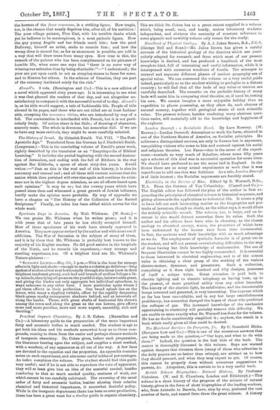Electricity in the Service of Man. Edited by R. Wormell,
D.Sc., M.A. From the German of Von Urbanitsky. (Cassell and Co.)— The English editor has followed the plan of the author in first ex- pounding the principles of electrical science in historical sequence, and giving afterwards the applications to industrial life. It seems a pity to have left out such interesting matter as the biographies and por- traits of inventors, though no doubt, as the editor says, it would dilute the strictly scientific record. The volutne, too, is large, and an in- crease in size would detract somewhat from its value. Both the author and his editors have been wise in choosing, as the closed analogy to electrical energy, water, the properties of which have been understood by the human race from time immemorial. In fact, the ancients used their knowledge with as much advantage as we do. The employment of symbolic formulas is of great use to the student, and will not present overwhelming difficulties in the way of those having but little knowledge of mathematics. The use of frequent illustration cannot be too highly commended. It is essential to those interested in electrical engineering, and is of the utmost value in obtaining a clear grasp of the working of the various electro-motors, dynamos, and generators. Such a collection, comprising as it does eight hundred and fifty designs, possesses of itself a unique value. Great attention is paid both to electric lighting and to electric telephony as having been, up to the present, of more practical utility than any other branches. The history of the electric light, its subdivision, and the innumerable lamps invented and patented, is very intending. The expense which so far has been unavoidable, and in any but large establishments prohibitory, has somewhat damped the hopsa of those who predicted the collapse of gas. Tho increased knowledge of the mechanics appertaining to electricity will probably remove this difficulty. We are unable to state exactly what Dr. Wormell has done for the volume. Ho has no doubt considerably simplified it ; anyhow, the result is a book which really gives all that could be desired.


































 Previous page
Previous page